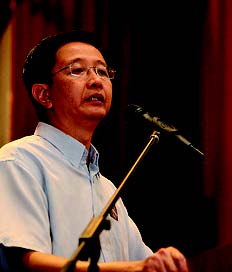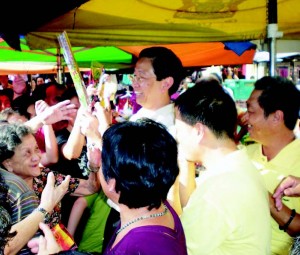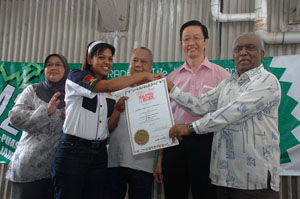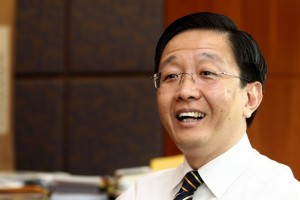 As one of the first two DAP lawmaker to hold the post of the state assembly speakers, Teng Chang Khim has been making waves for initiating many legislative changes in Selangor that has also impacted other Ulegislatures in the country.
As one of the first two DAP lawmaker to hold the post of the state assembly speakers, Teng Chang Khim has been making waves for initiating many legislative changes in Selangor that has also impacted other Ulegislatures in the country.
Under his tenure at the speakership, many legislative reforms have been undertaken, with the Special Select Committee on Corporate, Accountability and Transparency (SELCAT) being the most prominent.
The three-term assemblyman has gained prominence for his insight in legal matters. He is regularly consulted by the media on constitutional matters, especially legislative proceedings and statute interpretation.
Of course, many have remembered him for his more controversial episodes. He tells the Rocket his side of the story regarding his maverick reputation, legislature reforms and PR’s performance in Selangor.
As a first term Speaker of Selangor, how have you adapted to the role? Was it a culture shock for the civil servants, now having to serve under a former opposition member?
I have adapted quite well to the role. I had previously worked as a civil servant, serving as a court interpreter in Kuala Lumpur for six years. It is not an alien environment to me. Certainly, the role as a Speaker is different from other civil servants. It carries a different responsibility and facets to it.
There were some challenges initially for some of the state civil servants adapting to the new working culture under Pakatan Rakyat (PR). It was a culture shock for them. The first public hearing of the SELCAT opened the eyes of the many civil servants and public.
In the past I have been labelled as a lone ranger. I disagree with that label; I believe that there are a lot of silent supporters out there for me.
Let my performance and the passage of time speak for me.
They did not realise that the legislative assembly can exercise such wide power. Many were fearful of being the next to be called up. However, we explained to them that this is not something new and it is a part of the accountability process that is inherent in a democratic system that we are supposed to practise. That has allayed their fears somewhat as they are beginning to understand our agenda and requests.
I have broken the traditions of past Speakers by attending office every working day in a year. I consider it a matter of personal discipline to attend office daily. Also it was to demonstrate the importance of the Speaker’s position; he is not only a person who chairs the assembly and a figurehead. The Speaker also oversees several important monitoring committees.
What are some of the reforms that have been undertaken by the Selangor state legislature?
Some of the reforms since PR took over include having live telecast of the DUN, extended question and answer sessions for the ADUNs, institutionalising three additional standing committees to oversee the state government’s performance and reforming the House committees by having public hearings of governance issues. 
Another prominent reform is the SELCAT hearings. It is selective in its scrutiny of the administrative issues; we concentrate on areas that are of interest and serious nature to the public. It is an ad- hoc committee. Its proceedings will hopefully be a prototype and example for the other standing committees to emulate. The other committees will inherit some of its functions. By then SELCAT will be dissolved.
The other standing committees, namely for local government administration, district and land matters, government linked corporations (GLCs), have improved in monitoring the state administration. Previously all these areas would fall under the Public Accounts Committee (PAC) portfolio; now the work is being shared out to the other three committees.
Now PAC scrutinises those departments directly under the state government, while the other three committees will look into the local councils, state –controlled agencies and corporations. There will be more specialisation involved.
These scrutinised agencies and corporations will be empowered to make decisions that they have to account for. We are not looking to find fault with them, we want them to make decisions with a justifiable rationale. This will help enhance the effectiveness and efficiency of the state’s administration. This was the not case with the previous administrations.
What are the challenges that you face in your work?
It is lamentable that we have yet to realise the true spirit of the doctrine of separation of powers in the state’s governance. The administration of the legislative arm, for example staffing issues, comes under the control of executive arm. The Speaker doesn’t have any say in the budget allocation for and running of the legislative assembly.
I have drafted a bill known as the Selangor Legislative Assembly Service Commission (SELESA). This enactment will distinguish the separate roles and functions of the state government and the legislature. However, it has yet
to be approved and tabled by the executive committee (EXCOs).
As a state assemblyman (ADUN) yourself, how have you managed to handle the various local administrative and people issues in your constituency?
 The local council in my area is doing their level best to enforce the rules and regulations. Some people however are still used to the apathetic attitude of the previous administration. It is a fine balancing act, an art even, to appease both sides. It is a transitional period for all parties.
The local council in my area is doing their level best to enforce the rules and regulations. Some people however are still used to the apathetic attitude of the previous administration. It is a fine balancing act, an art even, to appease both sides. It is a transitional period for all parties.
The local councils have not acquired the skill to handle people issues. They are quick to respond and enforce when a few people make complaints and conclude it is the sentiment of the majority.
For example in my constituency, a recycling factory was set up illegally. The residents lodged complaints about it. The local council was directed to dismantle it immediately. However after much pleading by the factory owner, a grace period was extended to allow him to relocate it. It appeased the residents while the factory owner managed to minimise disruption to his business.
Another issue is the relocation of the main bus terminal in the Klang town area. The bus terminal relocation was approved almost ten years ago. The developer was granted the right to operate it; had the state government acquired it, we would have to spend RM 30 million to do so.
Some of the business operators complained about it. However it is necessary as it is an issue of proper town planning; the traffic flow in the town was choked by the increasing volume of the incoming vehicles. The buses were contributing to this. I had to see it through regardless of the protests thrown at it.
How do you deal with all the biased press coverage about yourself? Has it affected you?
I never had a sleepless night whatever the barbs thrown at me (laughs)! I don’t take the allegations personally. I don’t bring it back to my family. Some times my wife is upset with me on that.
Also I am often seen as short- tempered. I don’t think it is necessarily all bad; after my outburst I don’t carry the negative
feelings and thoughts with me anymore. In the past I have been labelled as a lone ranger. I disagree with that label; I believe that there are a lot of silent supporters out there for me. Let my performance and the passage of time speak for me.
How is PR performing in governing the state? What are the issues and problems that still plague the state government?
I believed we have definitely outperformed the previous BN government. We have some areas of weaknesses; the performance
of some of the civil servants and departments are not satisfactory. It is necessary to hire competent people. In this matter political preferences have to be put aside to realise it.
Admittedly the hiring process is constrained by the statutory requirements for the Public Service Commission (JPA) to vet and provide the candidates we want. However, it is an inescapable reality. We can’t use that excuse to justify sub-par performance for the state administration. We have to work with and convince our staff to go with our aims. We have to lead by example by giving them a clear directive.
There is also the problem of the negative publicity campaign by the mainstream media. The ceaseless harping on our shortcomings while ignoring our achievements doesn’t help. One subtle way played by the mainstream media is the by comparing of Selangor and Penang state governments’ performances.
Another area that needs addressing is the development for the rural Selangor areas. The Hulu Selangor by-election was a reminder to us that our delivery of services to the rural areas is ineffective.
What are the solutions? How is the state government alleviating them?
We try to focus on delivering what we set out to do. In certain aspects, Selangor has done better than Penang. However, we are not looking to compete with Penang. The approaches we take have to be suited to the prevailing conditions in Selangor.
With Selangor’s unique demographics and its balanced geographical distribution of the races, the governing approaches taken by PR would be appealing to Malaysians as a whole. As for the rural areas, physical and structural development will take time. It has to be worked out according to the timetable set.
After three years in partnership and in government with the other PR parties, how would you rate DAP’s relationship with other PR parties? What are the positives and challenges in working with other PR parties?
The PR parties in Selangor have been working very well in the past three years. Tan Sri Abdul Khalid’s leadership has been admirable in handling the arising issues. Although there are many issues that we don’t agree on, but we managed to resolve them.
The Selangor PR government is a working partnership in progress. No one has the last word on the crucial matters. We often have to come to a common ground. Frankly some areas that we set out to do have been held back due to the compromises made. We need to persuade each other and the people that this is the way to go about it; it will take time.
Some quarters have even accused us of reneging on our promises. However we have to look at the bigger picture; a lot of the promises we made have been fulfilled. Take for example the welfare policies executed; it is in line with the social democracy spirit that DAP espouses.
The cooperation amongst the Excos has been good, likewise for the backbenchers as well.
I am proud to admit that the cooperation in the Selangor PR team is stellar. The PR ADUNs and MPs now regularly appear in other PR parties’ ceramahs and events. This was not the case pre-2008. Of course it helps that Selangor is a wealthy state and the PR ADUNs get relatively higher allocations to organise events for their areas.
Despite the presence of many factions in all the PR parties in Selangor, we share a common vision when it comes to running Selangor. We want to deliver the best for the people.
What are the areas that PR need to improve on?
Some of our PR colleagues still possess a siege mentality. We are still thinking like an opposition party; on the other hand we have the BN ADUNs who are still acting like they are the government (laughs)! It is an adjustment phase for us.
DAP’s growing acceptance by all races in Malaysia seems to be unsettling BN. What does DAP need to improve to continue this momentum of support?
 DAP faces difficulty in attracting other races to the cause. While it is good that DAP Parliamentary Leader Lim Kit Siang has mooted the merger with SNAP in Sarawak, we need to work on the party racial composition here in Peninsular Malaysia. In the past I have proposed that no individual be admitted to be a party member singularly but as a group with different races represented in it. However it would be challenging, administrative-wise.
DAP faces difficulty in attracting other races to the cause. While it is good that DAP Parliamentary Leader Lim Kit Siang has mooted the merger with SNAP in Sarawak, we need to work on the party racial composition here in Peninsular Malaysia. In the past I have proposed that no individual be admitted to be a party member singularly but as a group with different races represented in it. However it would be challenging, administrative-wise.
Another idea I have mooted is that all future DAP dinner functions should only serve national food suited for everyone, not just Chinese cuisine. It is an unusual idea, but let’s think out of the box. Another handicap that DAP faces is the old habits of catering to the Chinese crowd in terms of form. An example is the usage of Chinese- only placards and signs on party organised functions. Our leaders don’t seem determined to address it.
On the plus side, in our national congress Bahasa Malaysia is gaining more prominence and used more widely. However we still have a lot of older generation supporters we are not conversant in BM; we have to be inclusive so that the things discussed reach them in the languages they are familiar with. -The Rocket



